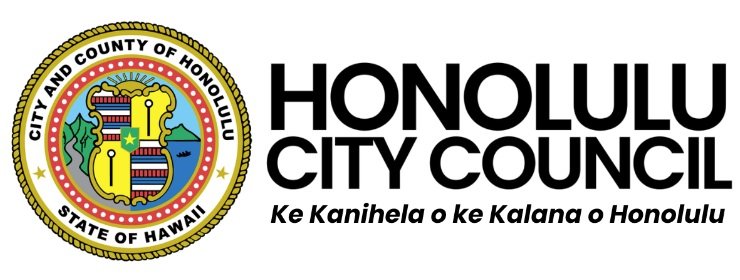
City’s FY26 Budget
From March to June, the Council carefully deliberates the City’s proposed budget package, which includes the Executive Operating and Capital Budgets, the Legislative Budget, and the HART Operating and Capital Budgets. This three-month process is the only opportunity for the public to suggest alternatives to the Mayor’s proposals by voicing their opinions directly to Councilmembers.
It is through the budget deliberation process that Councilmembers are able to directly respond to constituency concerns. Councilmembers may propose budget amendments to include funding that addresses specific district needs and ensures that quality services are provided to the public in the ensuing fiscal year. In this sense, it is the Council’s core responsibility to allocate City funds.
Honolulu City Council Budget Review
March 2025:
3/11: Administrative Overview and Capital Improvement Project (CIP) and Operating Budget Review by Department
3/12: CIP and Operating Budget Review by Department
3/13: CIP and Operating Budget Review by Department
3/14: CIP and Operating Budget Review (Contingency Day)
3/19: 1st Reading of Budget Bills at Council
FY26 Budget Meeting Dates
Budget Types:
Executive Operating Budget: Where the City gets its money and how it will pay for day-to-day operations. Operating expenses are paid for with cash revenues.
Executive Capital Budget: Identifies long-lived projects, facilities and large equipment that the City plans to develop or purchase over the next six years. Typically, the primary CIP funding source is bond proceeds.
Legislative Budget: Provides funding for legislative branch offices and typically only includes appropriations for operating expenses, which are financed with cash proceeds.
April 2025
4/1: Special CD1 Budget Meeting
4/16: 2nd Reading of Budget Bills at Council
May 2025:
5/12: Special CD2 Budget Meeting
June 2025:
6/4: 3rd Reading of Budget Bills at Council
6/15: Charter Deadline for Council to Adopt the Budget
Honolulu Authority for Rapid Transit (HART) Budgets: HART is a semi-autonomous public transit authority created to oversee the construction and operation of the rail system. The HART operating and capital budgets provide funding for the City’s rail transit project.
Revenue Program: Details where the City gets its dollars, such as taxes, fees and bond proceeds to finance the proposed budgets for the City. All proposed revenue generating legislation is subject to amendment by the City Council. The Council must annually set real property tax rates in conjunction with the adoption of the City budgets.
Budget Cycle:
Phase I – Preparation: The Mayor and the Administration prepare the operating and capital budgets, along with a revenue program for the upcoming fiscal year. HART also independently prepares its operating and capital budgets for submittal to the Council via the Mayor’s office. Simultaneously, the Chair of the Council prepares the legislative budget to provide funding for the legislative branch operational costs.
Phase II – Submittal, Review & Adoption: Section 9-102, RCH, mandates that the Mayor submit to the Council all documents pertaining to the proposed executive budgets not less than 120 days prior to the end of the fiscal year. Similarly, Section 3-111, RCH, requires the Council to submit the proposed legislative budget not less than 120 days prior to the end of the fiscal year. Section 17-106, RCH, requires HART to submit its budgets to the Council through the office of Mayor by December 1 of each year. The proposed budgets and accompanying documents are usually submitted on or around March 2. From March to June, the Council conducts a review of the proposed budgets and adopts the budgets for the ensuing fiscal year. During Phase II, the Council may amend any of the proposed budgets or revenue measures, as it deems appropriate. Upon adoption by the Council, the budget ordinances are subject to approval and/or veto by the Mayor and, if applicable, subsequent override by the Council.
Phase III - Administration & Enforcement: Once the budgets are enacted, agencies are authorized to make expenditures. Operating appropriations, once adopted are valid for one fiscal year. CIP appropriations, once enacted, are valid for 24 months in total.
Frequently Asked Questions
How can I get a copy of the budget measures?
All budget measures are available electronically through the Honolulu Record Collections page (HNL DOCS). Additionally, hard copies may be requested from the City Clerk’s Office or by contacting your Councilmember.
How do I find out when the public meetings are scheduled to hear the budget measures?
The City’s Annual Budget Process takes place from March to June. Electronic agendas are posted on HNL Docs.
Additionally, hard copy agendas are posted for viewing at Honolulu Hale.
How do I submit public testimony on any of the budget measures?
Citizens have multiple ways by which they may voice their opinions, as follows:
Provide written or register to testify orally on the individual budget measures at the scheduled public meeting by using the online Council Testimony Form available at https://hnldoc.ehawaii.gov/hnldoc/testimony.
How do I find out if a project in my neighborhood, such as a skate park, has been included in the budget?
The budget measures, specifically the CIP budget bill, will provide a list of proposed projects. If you are unable to locate a specific project in the CIP bill, you may contact your Councilmember.

